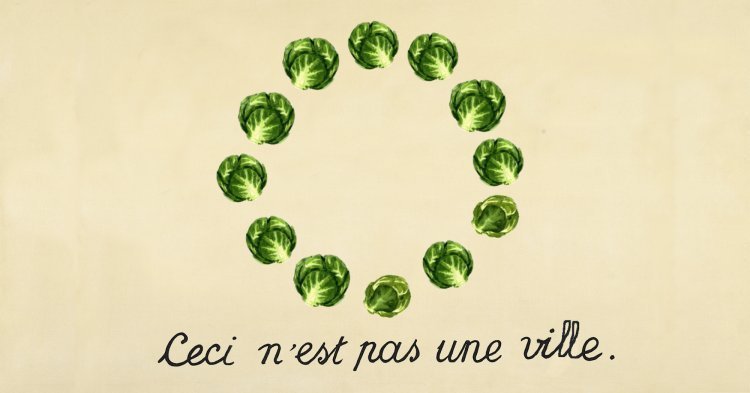Brussels does not exist. It is an illusion, a plot. It is not a capital, it is an excuse. The Belgians have been using it since 1830. From Bruges to Namur, as soon as something does not work, for the Flemings or for the Walloons, it’s the fault of Brussels. And in Magritte’s country, things often do not work. Thus, a scapegoat becomes essential. This city is an ideal window dressing, that would almost make you mistake Belgium for a country just like the others.
“It’s the fault of Brussels.” The concept spread to the rest of the continent when, in the 1950s, the nascent European Community settled there. “Europe will not be made all at once, or according to a single plan”, Father Schuman said. The same goes with the European institutions’ quarter. It happened by accident, as disorder sets up in a living room.
Everything started when the European Commission settled in 200 rue de la Loi – as if to say that Europe would be built according to the rule and the law. Little by little, office buildings hoisting the blue and golden flag chased the locals away. These big ocean liners made of glass and steel have no age: too modern to demonstrate any historical evidence, too shy to express an avant-garde tension towards future. They are neither beautiful nor ugly. They host long, rigid and implacable procedures, which go by drop by drop, with no haste.
No statues for the founding fathers, no obelisks, domes or column palaces. Only a roundabout that was called “Schuman”. No grandiosity, no splendour. In Brussels, “architect” is an insult.
On both sides of rue de la Loi, two watchdogs stare stonily at each other. On the one hand, the “Council”: an imposing bunker of brutalist inspiration in which ministers from all capitals adopt decisions that they will later blame on Eurocrats. On the other hand, the “Commission”: an old maid, a little bit tense, living in a big curved low-rise building that one used to like in the 1960s.
The Commission is adorned with a halo of mystery and power. One pictures it, Trojan horse of globalisation, full of athletic officials, hoplites in Italian suits and perfectly ironed white shirts, ready to slay the sovereignty of European peoples, armed with normative swords. Instead, we find circumspect and affable people, who internalised the states’ bullying as well as the general public’s marked distrust. Impact assessments, consultations, environmental and social analysis: the Commission is not easily caught off guard. But one thus cannot say that the atmosphere is highly charged. In the grey corridors, the voices are muffled, the atmosphere studious – far from the bustle of the European Parliament.
Because there is a Parliament. It is standing a little bit apart, as if sulking. We must point out that it arrived later on. We started without it. So it’s catching up and takes itself very seriously: parliamentary business is substantial here. The Parliament is here now, so the other institutions must deal with it. The Parliament is a Happy Families game, in 24 languages. In the right-wing family, can I have Spain; in the left-wing family, can I have Sweden; in Le Pen’s family, can I have the father. Geographic reliefs flatten with political codes. Everyone gets used to it, no matter the homeland. Vintage for the Communists, dishevelled for the Greens, badly tailored for the Socialists, or show-off for the Liberals, the dressing style is for the Conservatives as impeccably well-groomed as it is classic. Coming from France, the Netherlands or Austria, the extreme-right representatives bring their own touch, combining hunting jackets, brown suits and crew-neck buttoned polo shirts. However, one code remains universal among the parliamentary assistants: the more insecure the contract, the more squeezed the tie and the shorter the skirt.
The Parliament is a complex machine whose logic is however simple: it produces texts. On its assembly lines, bills arrive from the European Commission. Parliamentary committees work on them for months: meetings, seminars, expert hearings, missions on the ground. Each and every one expresses their position, equilibriums emerge. The MEPs’ imaginations become blunted over the meetings with legal and empirical constraints. Then comes the stage of compromises between the different political groups, always laborious, often painful. Then comes the time to vote: a big moment of self-congratulation in front of the accomplished work. But this is only the beginning. Then comes the deal with reality, i.e. the Member States gathered within the Council.
Indeed, while the Parliament was perfecting its text down to the last dot, the diplomats elaborated their own positions, to the barycentre of North and South, of East and West, taking into account small and big countries. The Council is the still in which national interests are distilled. It has to be heated up at very little temperature: not the “degree zero of politics”, but almost. The produced liquor is slightly bitter and not very strong – it should not make the capitals cough.
With the Parliament and Council standing their ground, the duel can start. But, like Ancient Rome’s gladiators, the two branches of the European legislative power do not have the same weapons at their disposal – otherwise the fight would not be entertaining. One cannot say in advance who will win between the retiarius and the murmillo. [1] On the one hand, the Parliament represented by an MEP for each political group, on the other hand the Member States represented by a minister or an ambassador. Here political cunning, there diplomatic cynicism. Slogans for some, weight of administrative apparatus for others. And in the middle, to arbitrate, the Commission attempts to save its text and incidentally deals with setbacks.
This strange congregation is called “trilogue”. Norms are here made as spirits are summoned. The room is slightly dark and doors are closed. Everyone put their finger on the glass. Rites are respected (“Dear Commissioner… Dear MEPs… Dear members of the Council”), incantations are intoned (“The European general interest dictates us to… Our fellow citizens expect that… Public opinion is not ready for…”). We wait a little, and then, miracle! The glass is moving. In this ouija game [2], all players have power, and so no one does. The glass seems to do whatever it wants: it slides from letter to letter, from article to article, from consideration to consideration. It sets fishing quotas, regulates the size of tyres, adding always more to the “European machine”. After several hours of normative spiritism, the glass gives its verdict, the European spirit has spoken: a little to the left, a lot to the right, a little to the South, mostly to the North.
At the heart of the night, a compromise was born. Each and every one added their touch: blue, red, a bit of yellow, a bit of green, blue-white-red. So, of course, the result is a slightly dull brown, difficult to tweet, impossible to tell in a 600-word insert.
No one will be fully satisfied. In Berlin we’ll hear “Europe is too permissive”, in Paris “Europe is rigid”. Yet in Brussels, it will be “an excellent compromise”. The European Commission, good pupil, will end up with many missions on its hands, without having the means to complete them successfully. Responsible, but not capable.
An agreement found, the meeting is closed. This is the end of the show – good, no one likes Brussels’ shows. As in an old cinema’s entrance, it is dark and it is raining. Umbrellas are unfolded. Some hurry to go back home, others are still talking a little about the film – sometimes one wonders if they watched the same. In the night, the cold Brussels’ rain is falling on the adopted text. Its colours dilute and drip to Malmö, Krakow, Granada and Besançon. Europe is everywhere, Europe is nowhere. Brussels, already, does not exist anymore.



Follow the comments: |
|
